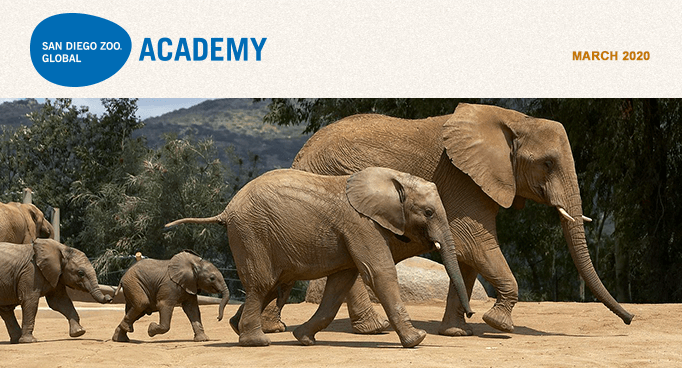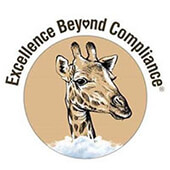 |
Elephants on Your Phone (or Tablet)
We've turned our former elephant module into a collection of five shorter modules, and the new modules are designed to run on your desktop computer, laptop, tablet, or even your phone—anywhere you have an internet connection! The Elephants collection is part of our Introducing Animals series. The individual modules allow for a more focused approach to the material, as each takes a narrower scope. Each module includes self-assessment opportunities and its own mastery test.
The first module in the collection is an introduction to the physical characteristics of elephants; the second module explores distribution and habitats. In Elephants 3, learners investigate the behavior and ecology of elephants. Elephants 4 explores elephant reproduction; and Elephants 5 covers the conservation status, threats, and conservation of elephants—including examples of how we can all participate in elephant conservation.
Each of the new Elephants modules takes about 40 minutes to complete, although participants progress at their own pace and may repeat the entire course—or sections of the course—as many times as they like.
For Academy members who have already downloaded the former Elephants module, be sure to delete the old module from your "My Courses" list before adding the new collection.
We're busy converting many of our existing modules to mobile-friendly platforms, and we're excited to share these with you on San Diego Zoo Global Academy. We've also got some brand-new modules coming: be on the lookout for a new Red Pandas module, and a five-part Bony Fishes collection later this year!
For more information about this article, please contact Donna Parham, dparham@sandiegozoo.org. |
Academy News
San Diego Zoo Global Academy's Safe Capture Training
The San Diego Zoo Global Academy's Safe Capture training offers in-person instruction in the safe chemical immobilization of animals, including strategies of approach, medication delivery techniques, capture pharmacology, drug dosages and volume calculations, post-capture care and anesthetic monitoring, and medical emergencies associated with chemical immobilization.
We are also developing online Academy course modules related to this training, traditionally offered only in person; and in the coming months, we will share how these online modules can be accessed. Additionally, the Academy's new Emergency Recall Training is key safety "Safe Capture" behavior training for animals in zoos. These best practices can save animal and human lives. This is why collaboration around training is so important to us.
In 2020, the Academy's new Safe Capture training is ramping up its in-person training schedule around the country. We started with three training sessions in 2019, and now we will share highlights of our rollout of this important training. When we can, we want to include our fellow zoos as event hosts for the training sessions held around the country.
 Thank you, Nashville Zoo! The Nashville Zoo just helped prove that collaboration among zoos around Safe Capture training is a big idea—for the zoos and the respective community of professionals working with wildlife species. We want to thank Rick Schwartz, CEO/president, Nashville Zoo, and Dr. Heather Robertson, director of veterinary services at Nashville Zoo, for making this a top-notch event—as well as the Nashville Zoo team who helped with the event, and the various staff members who attended the training. The training event was held at the HCA Healthcare Veterinary Center at the Nashville Zoo. Thank you, Nashville Zoo! The Nashville Zoo just helped prove that collaboration among zoos around Safe Capture training is a big idea—for the zoos and the respective community of professionals working with wildlife species. We want to thank Rick Schwartz, CEO/president, Nashville Zoo, and Dr. Heather Robertson, director of veterinary services at Nashville Zoo, for making this a top-notch event—as well as the Nashville Zoo team who helped with the event, and the various staff members who attended the training. The training event was held at the HCA Healthcare Veterinary Center at the Nashville Zoo.
Safe Capture Training Schedule
 Next Up: Next Up:
University of Nebraska, Lincoln: March 14 and 15 Download Flyer (PDF)
Coming Up:
Greek Peak Mountain Resort, Cortland, New York: April 14 and 15 CLASS FULL
 Followed By: Followed By:
Kansas City Zoo: April 23 and 24 Download Flyer (PDF)
BREC's Baton Rouge Zoo: May 4 and 5 Download Flyer (PDF)
Pittsburgh Zoo and PPG Aquarium: June 8 and 9 Download Flyer (PDF)
ZooTampa: October 1 and 2 Download Flyer (PDF)
To see our developing schedule of Safe Capture training events, visit the Safe Capture page on our Academy website.
For more information about the Academy's Emergency Recall Training for Zoos, please contact Jon Prange, jprange@sandiegozoo.org or Linda Duca, lduca@cypherworx.com.
If you are interested in being an event host for Safe Capture training, or if you would like to discuss a training event at your college, university, or other institution, please Contact Us for Safe Capture.
 The San Diego Zoo Global Academy Puts Parco Zoo Punta Verde in the Spotlight The San Diego Zoo Global Academy Puts Parco Zoo Punta Verde in the Spotlight
Parco Zoo Punta Verde in the province of Udine, Italy is part of the Academy's collaborative learning environment!
 Find Us on LinkedIn! Find Us on LinkedIn!
San Diego Zoo Global Academy is now on LinkedIn. We feature new posts frequently, highlighting Academy courses including the new Safe Capture training. For regular updates, check it out and follow us on LinkedIn. Tell your friends in the animal care profession, and help us build an ever-expanding community of connections in the wildlife world.
For more information about our LinkedIn presence, please contact Sarah Haggerty at shaggerty@sandiegozoo.org.
Administrator's Users Group Webinar
Please join us for the Administrator's Users Group Webinar, hosted by Academy partner CypherWorx. The next webinar is Wednesday, March 18, at 11 a.m. Pacific Daylight Time.
Register here.
After registering, you will receive a confirmation email containing information about joining the webinar. |
Academy Contributors

Getting Better All the Time
Understanding How the World Sees You Through the Animal Welfare Act Database, and Mastering that Knowledge to Help Animals
By James F. Gesualdi
To keep ahead, each one of us, no matter what our task, must search for new and better methods—for even that which we now do well must be done better tomorrow.
—James F. Bell
The United States Department of Agriculture (USDA) Animal and Plant Health Inspection Service (APHIS) Animal Care unit recently announced the rollout of its updated online Animal Welfare Act (AWA) database for inspection reports, animal inventories (or resident animals), and research facility annual reports. Here is the stakeholder announcement and the agency's letter to regulated entities The agency action responds to Congress's direction to restore records as of the 2017 agency removal of the database from its website. The database now contains all relevant records, including inspection reports, from 2014 to date.
This is transparency in action, as it provides the public with a longer-term perspective on an organization's AWA compliance record and progress (or continuing challenges). Here are some responsible actions to consider:
- Identify, review, and analyze inspection reports online for your organization. The searchable AWA database is found here.
- If your organization has a clean or relatively clean compliance record, take a moment to gratefully reflect on that, and the effectiveness of your efforts—and then ponder the ways you and your organization have actually improved over the period in question, and detail committed plans as well as nascent ideas for further improvement, in terms of AWA compliance and animal welfare.
- If your organization has had some issues or more serious challenges that are evident in your compliance record, take stock of and document the ways you have addressed/resolved and improved upon every single item. This should be something that is done any time there is an issue or challenge going forward. Compile those corrective measures (or fixes) and improvements, and frankly assess your progress. Then, denote and detail committed plans as well as nascent ideas for further improvement, in terms of AWA compliance and animal welfare.
- Examine internal awareness, knowledge, and familiarity with the inspection process, and the meaning and significance of inspection reports. See Making Inspection Reports Work For Animals, March 2017, available at Academy Newsletter March 2017.
- While animal and veterinary care staff and some leadership may know about these things, think about expanding the circle of awareness and knowledge to include board leadership, managers and directors, communicators, and other staff—such as facilities, cleaning, and security personnel—all of whom can contribute to AWA compliance, animal welfare, and safety. This also better positions the organization to have a strong and effective culture to work through future inspection and regulatory issues, challenges, and even crises.
Yet another piece of information will soon be added to the AWA database: Teachable Moments. According to the agency's instructive guidance document, Animal Welfare Inspection Guide (2019), Teachable Moments are minor non-compliant items (NCIs) not included within an inspection report because they are "not causing noticeable pain or distress to an animal," the organization "is willing and able to correct the issue quickly," the item was "not previously listed as a Teachable Moment or cited…within the last two years," and the organization meets certain other criteria. This agency tool meant to incentivize prompt corrective action on minor items has been criticized, because while Teachable Moments are NCIs, they have not been included within inspection reports. Therefore, they are not readily accessible to the public, although they are subject to Freedom of Information Act disclosure. Forthcoming posting of Teachable Moments on the database will add transparency. Zoological organizations should immediately identify, review, and analyze any prior Teachable Moments, and apply a similar process to that recommended above for inspection reports—even in advance of agency posting in the AWA database.
Agency evaluations memorialized in inspection reports and Teachable Moments comprise an organization's important compliance record. Agency posting in the AWA database and public access to that information is a means of transparency, fostering accountability for regulated entities such as accredited zoos and aquariums. We can and should go further, because we are dedicated to the animals in our care and their interests, protection, and well-being. Reviewing and improving our compliance and animal welfare programs, self-posting inspection reports, improvement plans, and self-certified compliance reporting, as well as periodic and annual reports on improvements and animal welfare advances, demonstrate that we care. Our spirit of service to the animals entrusted to our care is what we are about—today, tomorrow, and forever.
Culture is about making people feel good about how they contribute to the whole.
—Tracy Streckenbach
© 2020 James F. Gesualdi, P.C. The opinions expressed herein are solely those of the author. This is not, nor should it be construed as, legal advice.
For more information on EXCELLENCE BEYOND COMPLIANCE®, visit excellencebeyondcompliance.com. |

|